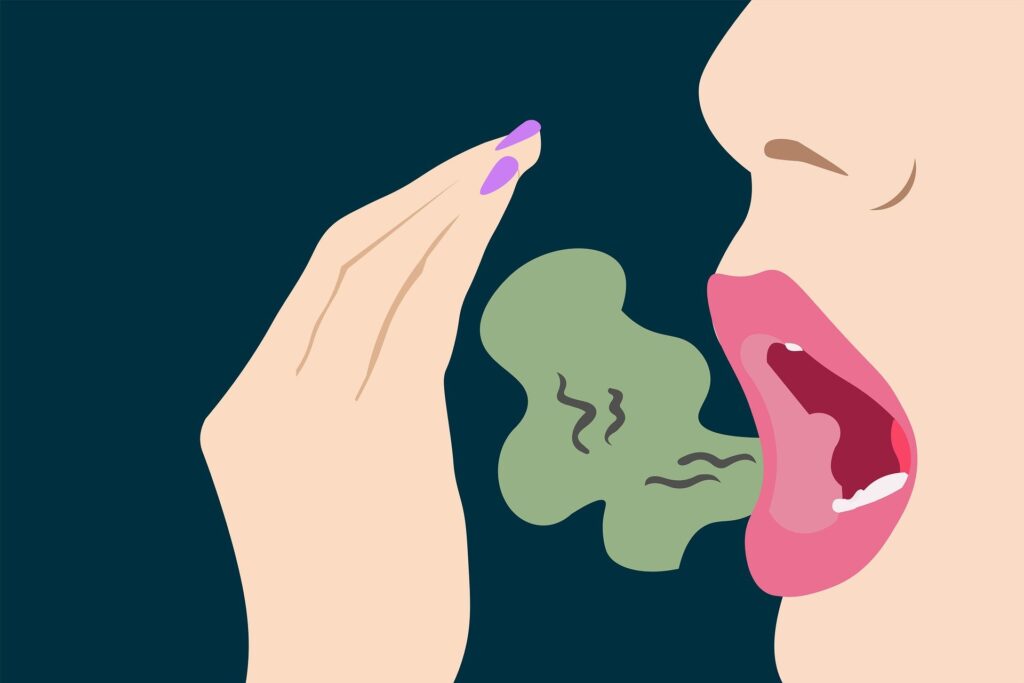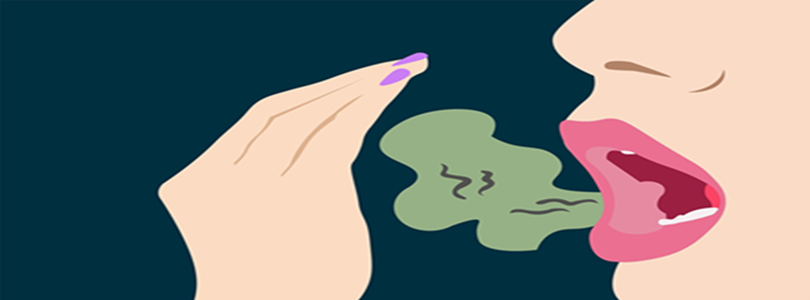
Bad breath, medically known as halitosis, is a common yet often embarrassing issue that many people face. While it’s normal to experience occasional bad breath, persistent halitosis can affect your confidence, social interactions, and overall well-being. Understanding the causes of bad breath and finding effective remedies are key steps to maintaining fresh breath and a healthy mouth. This article will dive deep into what causes bad breath and offer some tried-and-true remedies to help you eliminate it for good.
Table of Contents
What Causes Bad Breath?
Before discussing remedies, it’s essential to understand what leads to bad breath. The causes can vary from person to person, but most cases of halitosis are linked to oral hygiene, diet, and overall health. Here are some common causes:
1. Poor Oral Hygiene
Inadequate oral care is one of the leading contributors to bad breath. When food particles remain trapped between your teeth or on your tongue, bacteria break down these particles, leading to foul-smelling compounds. Additionally, the buildup of plaque and tartar on your teeth can harbour bacteria that contribute to bad breath.
2. Dry Mouth (Xerostomia)
Saliva is essential for neutralizing acids in your mouth, washing away food particles, and keeping bacteria levels in check. When your mouth produces less saliva, it can lead to dry mouth, a condition that often results in bad breath. Dry mouth can be caused by dehydration, certain medications, or medical conditions like Sjogren’s syndrome.
3. Diet
Certain foods like garlic, onions, and spicy dishes can temporarily cause bad breath due to their strong-smelling compounds. However, other foods high in sugar and carbohydrates can also contribute to bad breath by feeding bacteria in the mouth, leading to increased production of sulfur compounds.
4. Tobacco Use
Smoking or chewing tobacco not only leads to bad breath but also increases the risk of gum disease, which can further exacerbate halitosis. The chemicals in tobacco products can linger in your mouth and lungs, causing a persistent odour.
5. Medical Conditions
Certain medical conditions can cause or contribute to bad breath. These include sinus infections, respiratory tract infections, gastrointestinal disorders (such as acid reflux), and metabolic conditions like diabetes. In some cases, bad breath may be an early sign of a more serious underlying condition.
6. Dental Issues
Oral health problems such as gum disease, cavities, or abscesses can lead to chronic bad breath. Gum disease, in particular, creates pockets in the gums where bacteria can accumulate, leading to persistent foul odour.
Tried and True Remedies to Get Rid of Bad Breath
Now that we understand the potential causes of bad breath, let’s explore remedies that have been proven to help combat it effectively. These remedies range from improved oral hygiene practices to lifestyle changes that promote better breath.
1. Brush and Floss Regularly
Maintaining fresh breath begins with proper oral hygiene habits. Here’s how brushing and flossing can help:
Brush Twice Daily: Brushing your teeth at least twice daily, especially after meals, helps remove food particles and plaque that can cause bad breath. Make sure to brush every surface of your teeth using a fluoride toothpaste.
Don’t Forget Your Tongue: Your tongue can harbour bacteria and food debris, leading to bad breath. Each time you brush, clean your tongue with a tongue scraper or your toothbrush.
Floss Daily: Flossing removes food particles and plaque from between your teeth, areas that brushing alone cannot reach. This step is crucial in preventing bacterial growth and bad breath.
2. Use an Antibacterial Mouthwash
Mouthwash can be a great addition to your oral hygiene routine, as it helps kill bacteria that contribute to bad breath. Opt for an antibacterial mouthwash that contains ingredients like chlorhexidine or methylpyridinium chloride. These ingredients have been shown to reduce the bacteria that cause bad breath and promote overall oral health. Be sure to swish for at least 30 seconds to ensure the mouthwash reaches all areas of your mouth.
3. Stay Hydrated
As previously mentioned, dry mouth plays a major role in causing bad breath. Drinking plenty of water throughout the day helps keep your mouth moist, wash away food particles, and promote saliva production. If you struggle with dry mouth due to medications or other factors, consider chewing sugar-free gum or sucking on sugar-free candies to stimulate saliva flow.
4. Watch Your Diet
What you eat can have a profound impact on your breath. Consider these dietary strategies to maintain fresh breath.
Avoid Odor-Causing Foods: Garlic, onions, and certain spices can cause temporary bad breath. If you know you’ll be in a social situation, try to avoid these foods or brush your teeth after consuming them.
Eat Crunchy Fruits and Vegetables: Foods like apples, carrots, and celery act as natural toothbrushes, helping to clean your teeth and stimulate saliva production.
Limit Sugary and Starchy Foods: Sugar and starches can promote bacterial growth in the mouth. If you consume these foods, be sure to brush your teeth afterwards or at least rinse your mouth with water.
5. Quit Smoking and Avoid Tobacco Products
Tobacco use not only causes bad breath but also increases your risk of developing gum disease and oral cancer. Quitting smoking or chewing tobacco can have immediate and long-term benefits for your oral health and breath. Over time, your body will eliminate the lingering odours from tobacco, and your breath will improve.
6. Regular Dental Checkups
Regular visits to the dentist are essential for maintaining fresh breath and overall oral health. During your checkups, your dentist will remove plaque and tartar buildup that can harbour bacteria, and they’ll check for signs of gum disease or other oral health issues that may be contributing to bad breath. If you have chronic bad breath, your dentist may recommend more frequent cleanings or additional treatments.
7. Try Natural Remedies
If you prefer natural remedies for bad breath, several options can help freshen your breath without relying on chemical products. Here are a few:
Green Tea: Studies have shown that green tea contains antioxidants called polyphenols, which help neutralize bad breath and reduce bacterial growth in the mouth.
Herbs and Spices: Chewing on herbs like parsley, mint, or basil can help freshen your breath naturally. These herbs contain compounds that neutralize odours and stimulate saliva production.
Apple Cider Vinegar: Diluted apple cider vinegar can be used as a natural mouthwash to balance the pH levels in your mouth, making it less hospitable to odour-causing bacteria.
8. Address Underlying Medical Conditions
If your bad breath persists despite maintaining excellent oral hygiene and using remedies, it may be time to consult a healthcare professional. Underlying medical conditions, such as acid reflux, sinus infections, or diabetes, can contribute to bad breath. Treating the root cause of these conditions can help eliminate halitosis.
9. Chew Sugar-Free Gum
Chewing sugar-free gum is an effective way to freshen your breath, especially when you’re on the go and unable to brush your teeth chewing gum encourages saliva flow, which aids in rinsing away food particles and bacteria. Look for gum that contains xylitol, a natural sweetener that has been shown to reduce bacteria in the mouth.
10. Use a Humidifier
If you struggle with dry mouth, especially at night, using a humidifier in your bedroom can help. The added moisture in the air can prevent your mouth from drying out while you sleep, reducing the risk of morning breath.

Long-Term Tips for Maintaining Fresh Breath
Maintaining fresh breath requires consistent effort and healthy habits. Here are some long-term tips to ensure your breath stays fresh:
Practice Consistent Oral Hygiene: Make brushing, flossing, and tongue cleaning a part of your daily routine.
Stay Hydrated and Improve your Lifestyle: Drinking plenty of water it not only helps with bad breath but also supports your overall health.
Limit Alcohol and Caffeine: Both alcohol and caffeine can dry out your mouth, leading to bad breath. Try to limit your intake and drink water alongside these beverages.
Keep Your Dental Appointments: Regular dental checkups and cleanings are vital for preventing oral health issues and maintaining fresh breath.
Conclusion
Bad breath is a common issue that can be caused by a variety of factors, including poor oral hygiene, dry mouth, diet, and underlying medical conditions. By implementing effective oral hygiene practices and making small lifestyle changes, you can significantly reduce or eliminate bad breath. Tried-and-true remedies like brushing and flossing regularly, staying hydrated, using an antibacterial mouthwash, and avoiding odour-causing foods can all contribute to fresher breath. If your bad breath persists despite these efforts, consider consulting a dentist or healthcare provider to rule out any underlying issues. With the right approach, you can get rid of bad breath for good and enjoy the confidence that comes with fresh breath every day.


